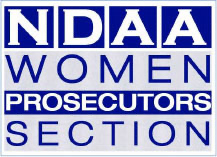NDAA Women Prosecutors Section

Join the National District Attorneys Association’s Women Prosecutors Section
The Women Prosecutors Section is open to all members of the NDAA. The Chair of the Committee is District Attorney Jackie Lacey of Los Angeles County, California.
Read More


